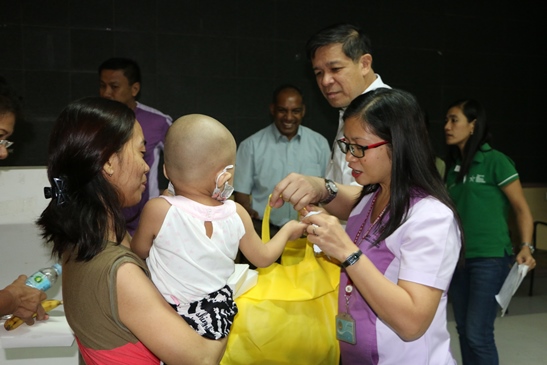
Apr 11, 2016 | Focolare Worldwide
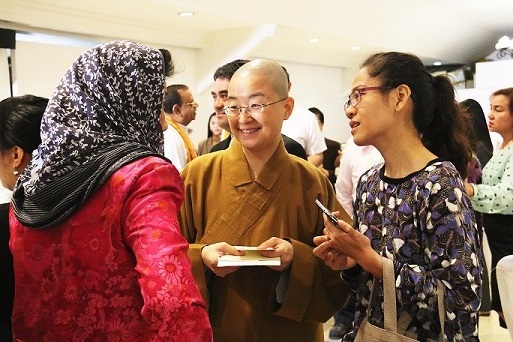
Breakfast Dialogue with Cardinal Tagle opens 2016 World Interfaith Harmony Week. Photo: Roman Catholic Archdiocese of Manila
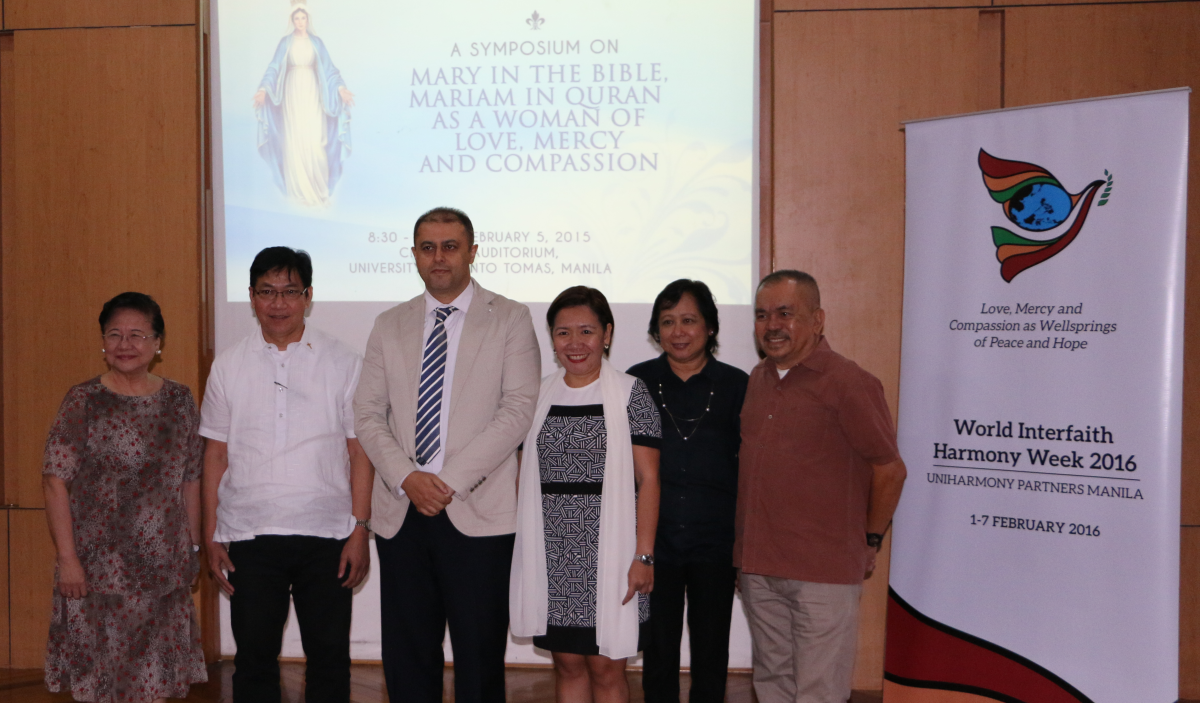 A joint symposium on Mary in the Bible and Mariam in Quran also proved to be quite interesting. The unanimous conclusion: Mary, woman of love, mercy and compassion, is a mother for all Christians and Muslims. Another significant event saw the attendance of 80 cancer patients and survivors. The opening remarks were based on the spirituality of Chiara Lubich. At the Fo Guang Shan Mabuhay Buddhist Temple the awards ceremony of a digital poster-making contest took place. It was organized with the Buddhist International Association – Manila, on the theme “Creating Peace and Hope through Acts of Goodness”.
A joint symposium on Mary in the Bible and Mariam in Quran also proved to be quite interesting. The unanimous conclusion: Mary, woman of love, mercy and compassion, is a mother for all Christians and Muslims. Another significant event saw the attendance of 80 cancer patients and survivors. The opening remarks were based on the spirituality of Chiara Lubich. At the Fo Guang Shan Mabuhay Buddhist Temple the awards ceremony of a digital poster-making contest took place. It was organized with the Buddhist International Association – Manila, on the theme “Creating Peace and Hope through Acts of Goodness”. 
At Sulyap ng Pag-asa Housing Project
https://www.youtube.com/watch?v=teamVMfAoKw
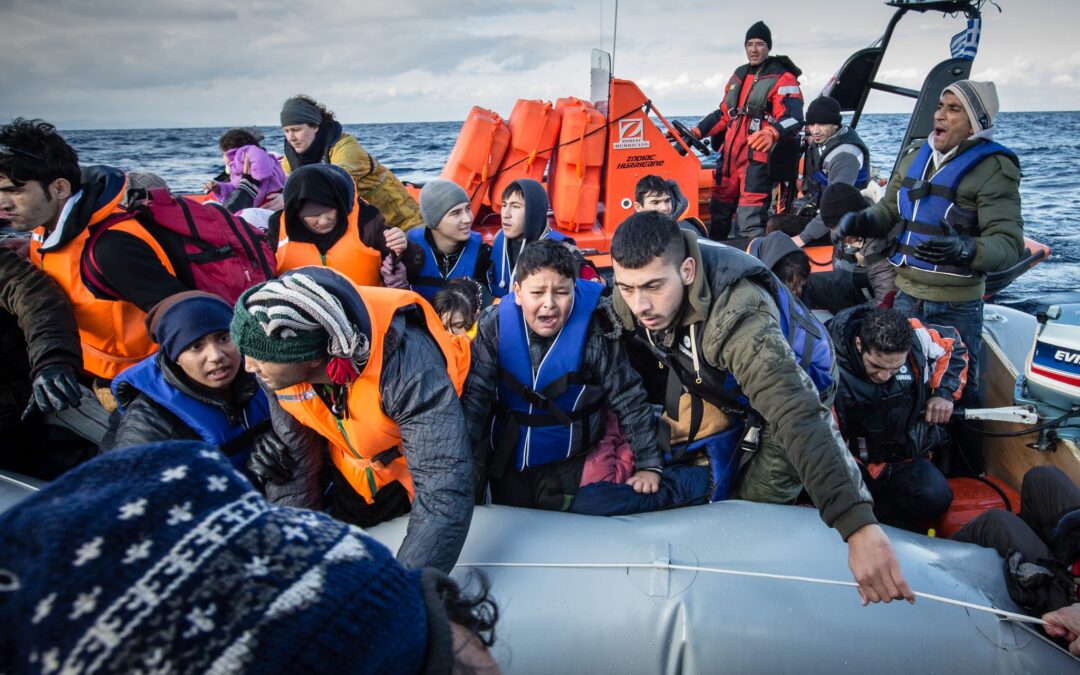
Apr 10, 2016 | Non categorizzato
 “While realizing that the foundation of the Gospel is charity… we did not immediately understand how to live it, nor with whom, nor to what degree we were to put it into practice. At the beginning, due mainly to the distressing circumstances of the war, we directed our love toward the poor. We were convinced that in those gaunt and, at times, repulsive faces, we could make out the face of the Lord. It was a real training. We were not accustomed to loving supernaturally. At most, we cared about our relatives or our friends in a spirit of warm respect or in a purely natural and healthy friendship. Now, under the impulse of grace, trusting in God and in his Providence which cares for the birds of the air and the flowers of the field, we addressed our attention to all the poor of the city. We invited them to our houses, to eat at our table… (…) When we could not receive them in our home, we arranged to meet them somewhere, and we gave them whatever we had managed to put together. We visited them in their dismal shacks and we comforted them and offered them medicines. The poor were truly the object of our love because for them and through them we could love Jesus. They became the concern also of those who had been attracted by our common ideal. As the community grew around the initial nucleus of the focolarine, the possibilities of helping, of assisting whoever suffered grew. And it was quite a sight to see tons of food, clothing and medicine arrive; it was an unusual abundance which, considering that we were in the last years of the war, clearly made the special intervention of divine Providence obvious to anyone. (…) These are small events which happen to whoever, being a follower of Jesus, experiences ‘Ask and it will be given to you’ (Mt 7:7). Nevertheless, they never ceased to amaze us. At the same time, we were encouraged by other extraordinary events experienced by our great brothers and sisters who had preceded us and who also knew—at a time when they were not yet saints—the difficulties encountered in the ascent to God, in the process of thawing the hardened human personality by the fire of Divine Love. Hadn’t Saint Catherine, in her love for the poor, given to one her mantle and to another the cross on her rosary? And hadn’t Jesus appeared to her in a vision the following nights to thank her for the gifts she had given to him in the poor? And didn’t St. Francis give away his cloak to the poor some thirty times? Surely, then, it was no great sacrifice for us to take off our gloves in the winter and offer them to somebody who needed to beg for hours out in the cold just to survive (…) Yet, in spite of everyone’s great generosity (…) it became clear that perhaps this was not the immediate goal for which the Lord had urged us to love in a concrete way. It was only later that we seemed to understand the Lord had urged us in this direction also for an intention of his own: it is in love and through the practice of love that one can better comprehend the things of heaven, and that God can more easily enlighten our souls. It was probably because of this concrete love that later on we understood that we didn’t have to turn only towards the poor but towards everyone indiscriminately. No doubt there were people who needed to be fed, to be given drink, to be clothed, but also those who needed to be educated, advised, put up with, or who were in need of our prayers…. The corporal and spiritual works of mercy opened up before us. Furthermore, they were the precise questions that the Judge of our lives would ask in order to decide our eternity. This thought immersed us in adoration considering the infinite love of Jesus who had revealed them to us when he came on earth so as to make it easier for us to get into heaven. (…) God was not asking us only to love the poor, but each and every neighbour, whoever they were, as we love ourselves. So if we came across someone who was weeping, we tried to weep with him and their cross was lightened. If someone rejoiced we rejoiced with them, and the joy was all the greater. ‘Rejoice with those who rejoice, weep with those who weep’ (Rom 12:15).” Chiara Lubich, May they all be one, New City Press, NY, 1984, pp.44-48.
“While realizing that the foundation of the Gospel is charity… we did not immediately understand how to live it, nor with whom, nor to what degree we were to put it into practice. At the beginning, due mainly to the distressing circumstances of the war, we directed our love toward the poor. We were convinced that in those gaunt and, at times, repulsive faces, we could make out the face of the Lord. It was a real training. We were not accustomed to loving supernaturally. At most, we cared about our relatives or our friends in a spirit of warm respect or in a purely natural and healthy friendship. Now, under the impulse of grace, trusting in God and in his Providence which cares for the birds of the air and the flowers of the field, we addressed our attention to all the poor of the city. We invited them to our houses, to eat at our table… (…) When we could not receive them in our home, we arranged to meet them somewhere, and we gave them whatever we had managed to put together. We visited them in their dismal shacks and we comforted them and offered them medicines. The poor were truly the object of our love because for them and through them we could love Jesus. They became the concern also of those who had been attracted by our common ideal. As the community grew around the initial nucleus of the focolarine, the possibilities of helping, of assisting whoever suffered grew. And it was quite a sight to see tons of food, clothing and medicine arrive; it was an unusual abundance which, considering that we were in the last years of the war, clearly made the special intervention of divine Providence obvious to anyone. (…) These are small events which happen to whoever, being a follower of Jesus, experiences ‘Ask and it will be given to you’ (Mt 7:7). Nevertheless, they never ceased to amaze us. At the same time, we were encouraged by other extraordinary events experienced by our great brothers and sisters who had preceded us and who also knew—at a time when they were not yet saints—the difficulties encountered in the ascent to God, in the process of thawing the hardened human personality by the fire of Divine Love. Hadn’t Saint Catherine, in her love for the poor, given to one her mantle and to another the cross on her rosary? And hadn’t Jesus appeared to her in a vision the following nights to thank her for the gifts she had given to him in the poor? And didn’t St. Francis give away his cloak to the poor some thirty times? Surely, then, it was no great sacrifice for us to take off our gloves in the winter and offer them to somebody who needed to beg for hours out in the cold just to survive (…) Yet, in spite of everyone’s great generosity (…) it became clear that perhaps this was not the immediate goal for which the Lord had urged us to love in a concrete way. It was only later that we seemed to understand the Lord had urged us in this direction also for an intention of his own: it is in love and through the practice of love that one can better comprehend the things of heaven, and that God can more easily enlighten our souls. It was probably because of this concrete love that later on we understood that we didn’t have to turn only towards the poor but towards everyone indiscriminately. No doubt there were people who needed to be fed, to be given drink, to be clothed, but also those who needed to be educated, advised, put up with, or who were in need of our prayers…. The corporal and spiritual works of mercy opened up before us. Furthermore, they were the precise questions that the Judge of our lives would ask in order to decide our eternity. This thought immersed us in adoration considering the infinite love of Jesus who had revealed them to us when he came on earth so as to make it easier for us to get into heaven. (…) God was not asking us only to love the poor, but each and every neighbour, whoever they were, as we love ourselves. So if we came across someone who was weeping, we tried to weep with him and their cross was lightened. If someone rejoiced we rejoiced with them, and the joy was all the greater. ‘Rejoice with those who rejoice, weep with those who weep’ (Rom 12:15).” Chiara Lubich, May they all be one, New City Press, NY, 1984, pp.44-48.
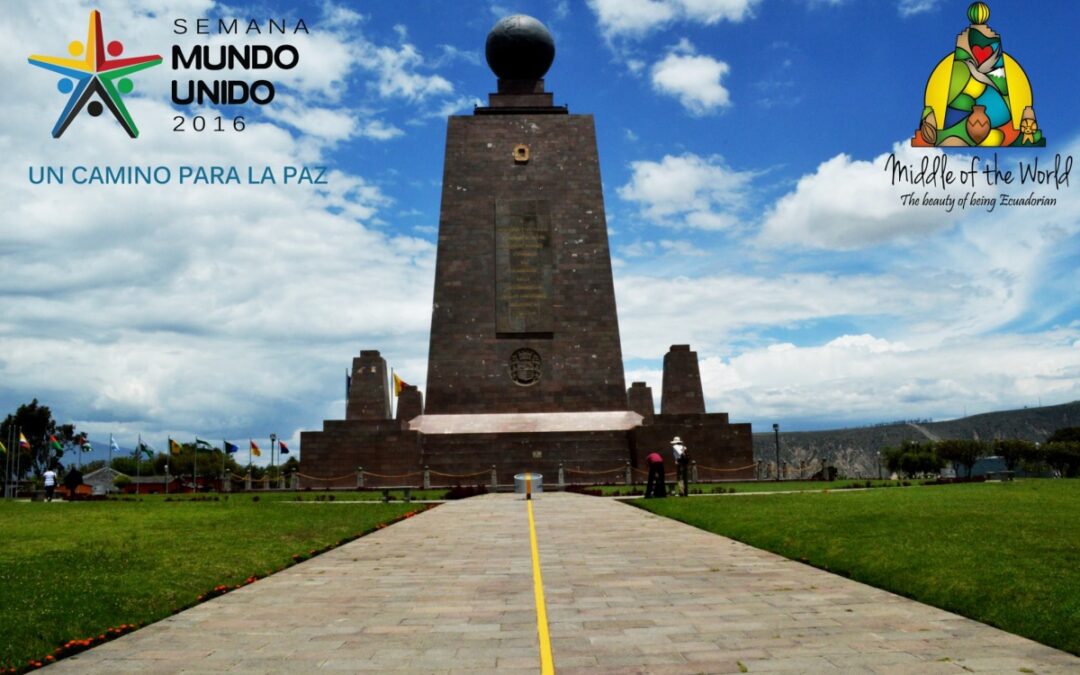
Apr 9, 2016 | Focolare Worldwide
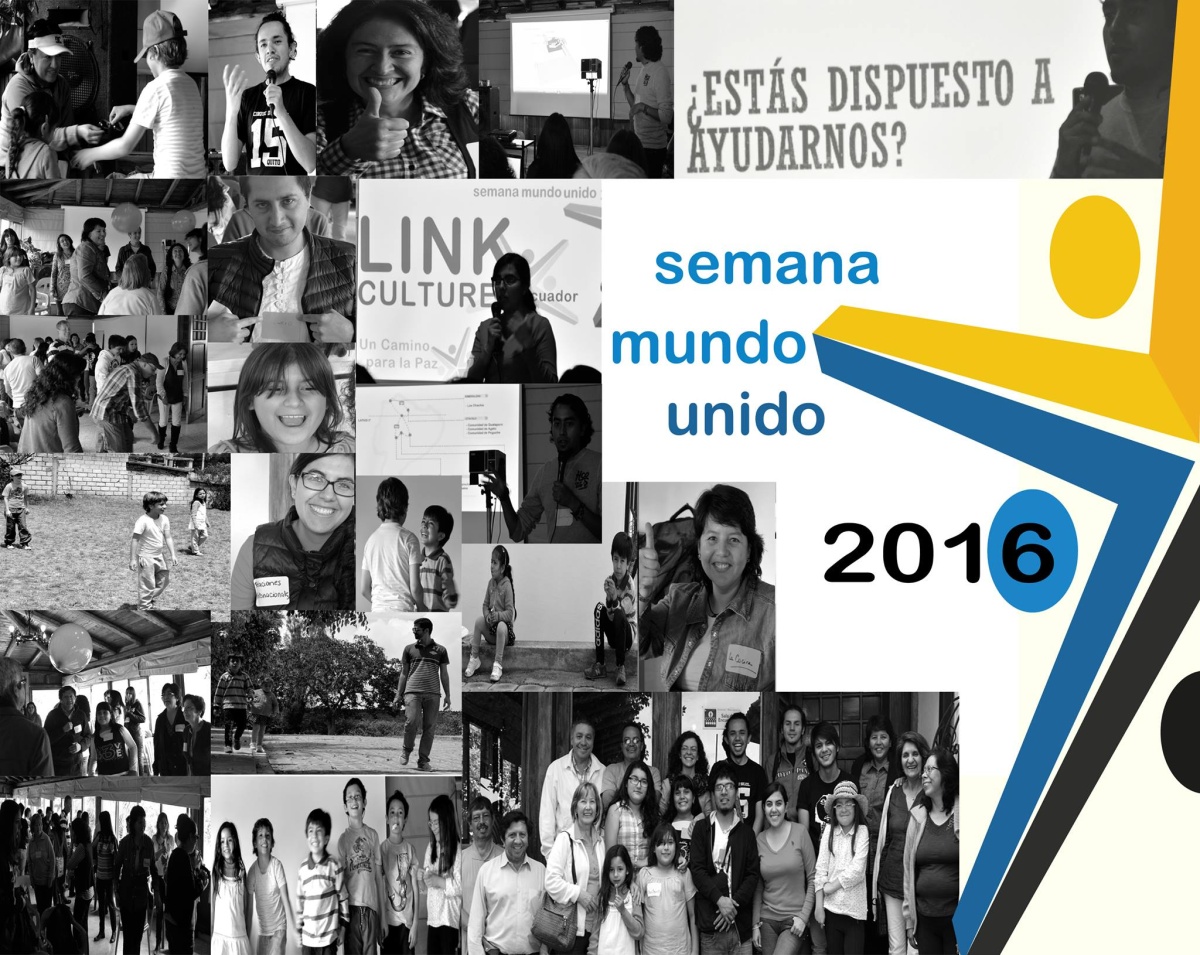 The centre of the 2016 United World Week will be Ecuador where interculturalism, peace and unity in diversity will be celebrated. Events will include opportunities to know and be enriched by the diversity of ethnic cultures in the country. The title of the event is: “LINK CULTURES – Un Camino para la Paz (A Path For Peace), and the overriding theme will be interculturalism that translates into dialogue with different ethnic cultures and recognises their dignity which makes us equals. The event will involve young people from many South American and European countries. Ecuador is strategically situated in the middle of the world. It has a population of some 15 million people and is divided into four main regions: the coastal lowlands, La Sierra, the East and the Galapagos Islands. The country is internationally known for the huge biodiversity, as well as for the multiculturalism of the population. Since 2008 the Ecuadoran Constitution has included interculturalism and multi-nationality and the defence of these characteristic features of the country, as well as the defence and promotion of “Sumak kawsay” (in the indigenous kichwa language, ‘good living’ in harmony with nature) and the rights of nature. UWW 2016 will have two parts. It will begin with a “traveling school” (May 1 – May 6) during which young people will visit several regions of Ecuador to have a living experience of interculturalism in the midst of different communities of the country. They will live and work amongst the local people, becoming more deeply acquainted with life in the South American land. The young people will choose between: Costa-La Sierra and Oriente-La Sierra. The former includes the provinces of Esmeraldas and Imbabura where the young people will have direct contact with the Gualapuro, Agato and Peguche communities. The latter includes the provinces of Pastaza, Tungurahua and Bolicar where they will meet the Shiwacocha, Kisapincha, Salasaka and Bolivar communities. Each stop is meant to be an opportunity to build relationships at different levels: with nature, with others and with themselves. Thus, the young people and the local people will be protagonists of real, true laboratories of community living in which they will be able to share, to learn, to experience and to become living witnesses to an exchange of gifts amongst different cultures.
The centre of the 2016 United World Week will be Ecuador where interculturalism, peace and unity in diversity will be celebrated. Events will include opportunities to know and be enriched by the diversity of ethnic cultures in the country. The title of the event is: “LINK CULTURES – Un Camino para la Paz (A Path For Peace), and the overriding theme will be interculturalism that translates into dialogue with different ethnic cultures and recognises their dignity which makes us equals. The event will involve young people from many South American and European countries. Ecuador is strategically situated in the middle of the world. It has a population of some 15 million people and is divided into four main regions: the coastal lowlands, La Sierra, the East and the Galapagos Islands. The country is internationally known for the huge biodiversity, as well as for the multiculturalism of the population. Since 2008 the Ecuadoran Constitution has included interculturalism and multi-nationality and the defence of these characteristic features of the country, as well as the defence and promotion of “Sumak kawsay” (in the indigenous kichwa language, ‘good living’ in harmony with nature) and the rights of nature. UWW 2016 will have two parts. It will begin with a “traveling school” (May 1 – May 6) during which young people will visit several regions of Ecuador to have a living experience of interculturalism in the midst of different communities of the country. They will live and work amongst the local people, becoming more deeply acquainted with life in the South American land. The young people will choose between: Costa-La Sierra and Oriente-La Sierra. The former includes the provinces of Esmeraldas and Imbabura where the young people will have direct contact with the Gualapuro, Agato and Peguche communities. The latter includes the provinces of Pastaza, Tungurahua and Bolicar where they will meet the Shiwacocha, Kisapincha, Salasaka and Bolivar communities. Each stop is meant to be an opportunity to build relationships at different levels: with nature, with others and with themselves. Thus, the young people and the local people will be protagonists of real, true laboratories of community living in which they will be able to share, to learn, to experience and to become living witnesses to an exchange of gifts amongst different cultures. 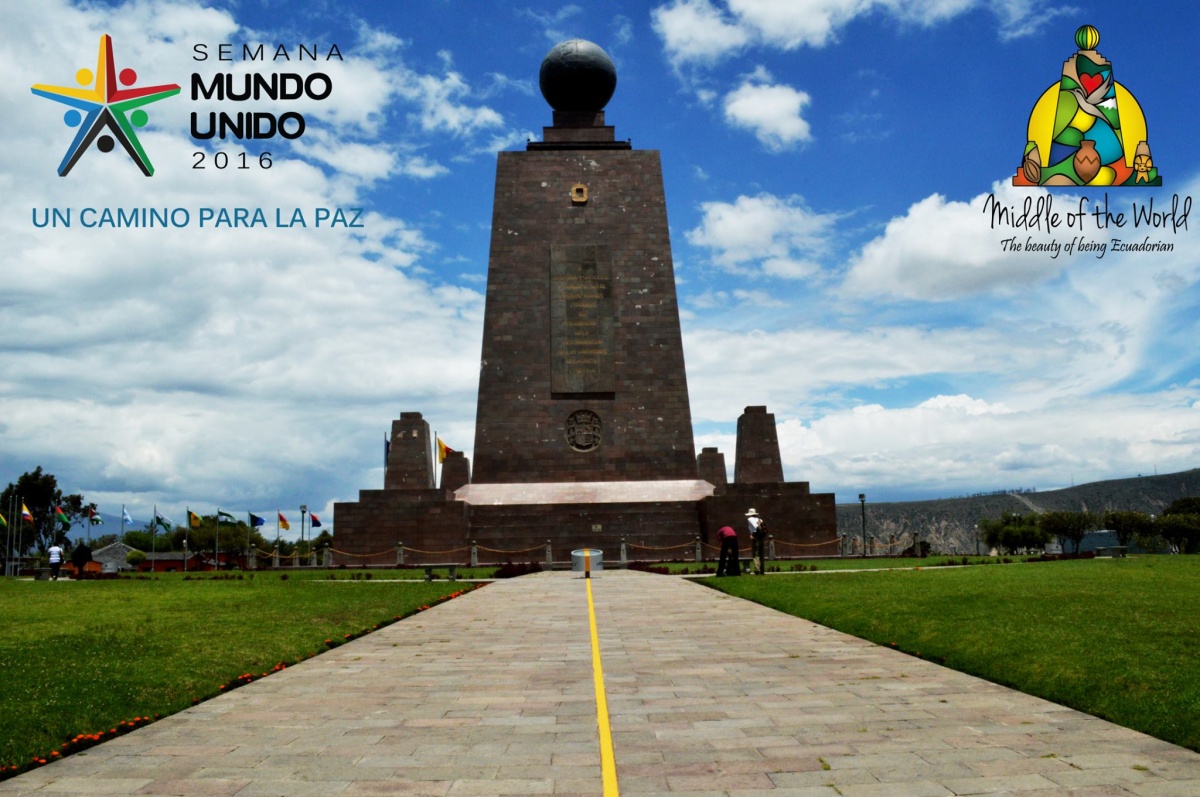 The second part (May 7) will be a Festival For Peace in the tourist region known as The Middle of the World, an Ecuadoran icon that is internationally famous. It will be a large event that will engage young people from many cultures, faiths and walks of life. The goal is to highlight fraternity in an intercultural context and to commit to living peace and unity in respect for differences, through the practice of the Golden Rule that invites us to “Do to others as you would have them do to you.” The Young For Unity in Ecuador is also promoting two contests, one for music and another for photography. They have high dreams of beginning a permanent Peace School. Simultaneous events will take place in other cities of the world during United World Week 2016, which will be led by the young peacemakers. Information: info@mundounido2016.com Official website: www.mundounido2016.com
The second part (May 7) will be a Festival For Peace in the tourist region known as The Middle of the World, an Ecuadoran icon that is internationally famous. It will be a large event that will engage young people from many cultures, faiths and walks of life. The goal is to highlight fraternity in an intercultural context and to commit to living peace and unity in respect for differences, through the practice of the Golden Rule that invites us to “Do to others as you would have them do to you.” The Young For Unity in Ecuador is also promoting two contests, one for music and another for photography. They have high dreams of beginning a permanent Peace School. Simultaneous events will take place in other cities of the world during United World Week 2016, which will be led by the young peacemakers. Information: info@mundounido2016.com Official website: www.mundounido2016.com
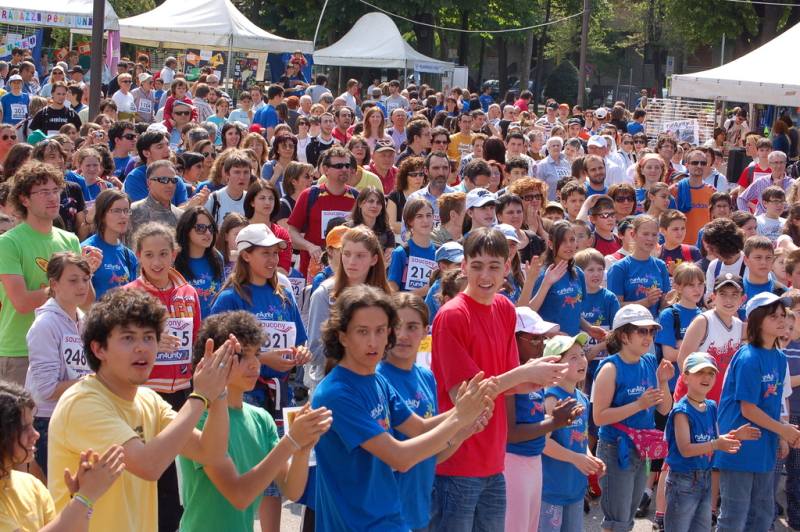
Apr 8, 2016 | Focolare Worldwide, Senza categoria
https://www.youtube.com/watch?v=fmnzghp0ghg&feature=youtu.be This year, the annual event promoted by the youth of the Focolare, which aims to involve the greatest number of people and institutions in the journey towards peace, will be centered in Quito, Ecuador. Intercultural dialogue will be the theme of the youth meeting to be held at the so-called “Other end of the world,” where one foot can be set on the aurora borealis hemisphere and the other on the austral hemisphere. Days of dialogue will ensue among youth of different cultures, along with working and sharing groups, and community tourism surrounded by verdant nature. All the information on the Ecuador programme can be found on www.mundounido2016.com. “Link Cultures – un camino para la paz” is the title that all the fraternal initiatives will have in common, to be held simultaneously throughout the world, uniting generations and cultures in a sole workshop, and can be traced through the hashtag #4peace. 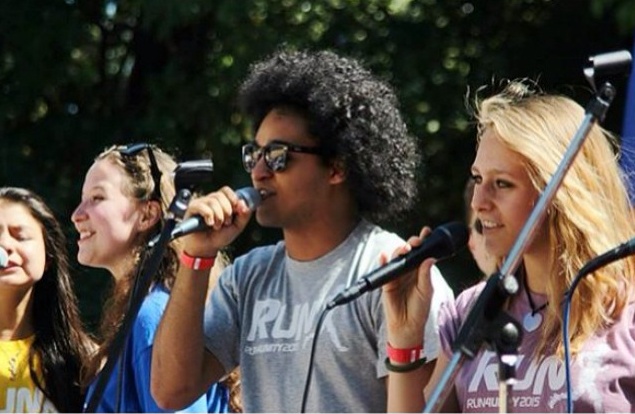 Some historical data. May ’95, the Genfest – a big world event of the Youth for a United World – ended with the launching of the United World Week (UWW): to contribute to the building of peaceful relationships of coexistence among different cultures and peoples, while respecting the identity of each community. A proposal to the public or private, national and international institutions, to highlight and uphold the initiatives that promote unity at every level, the UWW is an integral part of the United World Project. Twenty years after that historic event: a multitude of initiatives of the youth, adolescents and adults, were launched in these editions of the UWW that progressively became known to the general public, the mass media, and institutions worldwide. At all points of the planet, people were strongly attracted to the aim of convincing the world that “this is the time for brotherhood.” In 2010, a global link-up from Hungary paved the way to the UWW. In the 2011 edition the global streaming instead started from the small town of Sassello (Italy), hometown of Chiara Luce Badano, a young member of the Focolare who died in 1990 and was beatified in 2010. The UWW of 2012 preceded the Genfest held in Budapest (12,000 youth in the Sports Arena and 500,000 in a live streaming through the social networks). In 2013 the event was broadcasted from Jerusalem: 120 youth of 25 countries, Muslims, Christians and Jews, lived a strong experience of fraternity, which became a lifelong action plan for the country’s future. The “focus” of the United World Week 2014 was Nairobi, with the reciprocity construction site, “Sharing with Africa,” and the UWW 2015 entitled “Fabric, Flavour, Festival – discovering fraternity” that developed the theme of dialogue at all latitudes. The central event was enlivened by the Youth for a United World of Mumbay, India with the youth of the Hindu Shanti Ashram movement, an ulterior sign of how these events unite different peoples and religions.
Some historical data. May ’95, the Genfest – a big world event of the Youth for a United World – ended with the launching of the United World Week (UWW): to contribute to the building of peaceful relationships of coexistence among different cultures and peoples, while respecting the identity of each community. A proposal to the public or private, national and international institutions, to highlight and uphold the initiatives that promote unity at every level, the UWW is an integral part of the United World Project. Twenty years after that historic event: a multitude of initiatives of the youth, adolescents and adults, were launched in these editions of the UWW that progressively became known to the general public, the mass media, and institutions worldwide. At all points of the planet, people were strongly attracted to the aim of convincing the world that “this is the time for brotherhood.” In 2010, a global link-up from Hungary paved the way to the UWW. In the 2011 edition the global streaming instead started from the small town of Sassello (Italy), hometown of Chiara Luce Badano, a young member of the Focolare who died in 1990 and was beatified in 2010. The UWW of 2012 preceded the Genfest held in Budapest (12,000 youth in the Sports Arena and 500,000 in a live streaming through the social networks). In 2013 the event was broadcasted from Jerusalem: 120 youth of 25 countries, Muslims, Christians and Jews, lived a strong experience of fraternity, which became a lifelong action plan for the country’s future. The “focus” of the United World Week 2014 was Nairobi, with the reciprocity construction site, “Sharing with Africa,” and the UWW 2015 entitled “Fabric, Flavour, Festival – discovering fraternity” that developed the theme of dialogue at all latitudes. The central event was enlivened by the Youth for a United World of Mumbay, India with the youth of the Hindu Shanti Ashram movement, an ulterior sign of how these events unite different peoples and religions.  Run4Unity – Another novelty for this year is the involvement of the children: the world sports event Run4Unity, a relay race for peace which in the previous editions saw the participation of thousands of adolescents, from now on will be held annually as part of the United World Week. Run4Unity 2016 will take place on 8 May. The Youth for a United World hope that this international and travelling expo, now on its 20th year, will be recognised by the UN. The initiatives to be carried out throughout the year, and on which the United World Week will spotlight, are contained in the United World Project platform.
Run4Unity – Another novelty for this year is the involvement of the children: the world sports event Run4Unity, a relay race for peace which in the previous editions saw the participation of thousands of adolescents, from now on will be held annually as part of the United World Week. Run4Unity 2016 will take place on 8 May. The Youth for a United World hope that this international and travelling expo, now on its 20th year, will be recognised by the UN. The initiatives to be carried out throughout the year, and on which the United World Week will spotlight, are contained in the United World Project platform.
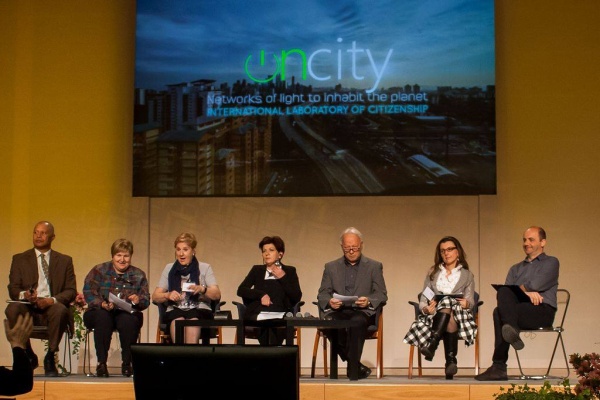
Apr 7, 2016 | Focolare Worldwide
 Nasri studied in Milan (Italy), to then specialise in Urban Sciences in Venice. Upon returning to his homeland 20 years ago, he was introduced to the Focolare Movement. According to him, this meeting changed his life. He now has three daughters who are 17, 15 and 13 years old. We met him on the occasion of the international OnCity, on public heritage assets (Castel Gandolfo 1-3 April). What challenges do you have to face daily in your homeland? “I work in the constructions sector. For political reasons we have a hard time renewing the 1970 town planning schemes. To open a new road or modify a route, we need permits, but the Israeli military authorities refuse to issue them.” Is it really possible to “love your enemy?” “It is not easy to be a real Christian in Palestine. In this sector the real enemy is the Israeli military authority, not the Jews! I respect the Jewish religion because we are all brothers, sons of God. But how can I love an Israeli soldier who kills me? And destroys our cities? Who occupies our territory? How can I live Christianity? I tried to discuss this with other Christians. I understood that if we are unable to love, we can at least try not to hate, and slowly, love will come. I stuck the words “do not hate” in my mind and heart and started to live them in my world. They have often been of help, for example, in smiling at a soldier, especially at the check point, since unfortunately, we Palestinians cannot move around freely. We are surrounded, like in a prison. Once, a captain asked me why I had smiled at him, though I was a Palestinian Arab. I answered: Jesus said “we have to love everyone,” and I love you. He was impressed, and did not know what to say. He let me pass without checking me too much! Love exists, also in the heart of the Israeli occupiers as in the heart of every human being on earth. I do not blame them, because they are soldiers and have to obey orders. We leave the conflicts to the governments, and we as peoples can live together. But the youth find this difficult to accept, especially today where through the internet they see how the world is outside Palestine.” How do you manage with the Focolare Movement in the Holy Land? “I am a volunteer and active in the New Families. We promote activities in the various churches with the Christian Community in Bethlehem. I am a Greek-Orthodox and my wife is Catholic. We go to those in need: the elderly, abandoned children or the mentally ill who need to be loved. We try to do our best…” Are there Jews among those who are in contact with the Movement? “Many Jewish families are friends of ours. We hold meetings together. One of my daughters plays soccer. Through the Peres Center for Peace her team, along with the Israeli team, was invited by the Real Madrid. This was her first contact with Jewish peers, and it was a new experience. When she returned she said: «All the Jewish players are my friends.» We keep in touch also with many Muslim families: in Palestine, 99% are Muslim, and 1% is Christian. As members of the Focolare Movement, we have a very good relationship with the Muslims and also the Jews. This proves that it is possible to live together.” If you could give a m”ssage to the world, what do you desire most for your land? «Please remember us. There are Christian Palestinians who are suffering. We once formed 10% of the population, but the emigration of Christian Families has increased a lot. I fear that one day, there will not even be a Christian. Help us to solve this Palestinian problem. If peace is created in the Middle East, there will be peace for the whole world. We know what God’s will is, but we also need the will of human beings. It is a strategic point, rich in spirituality. We only need unity. If unity exists among these three religions, the Middle East would be in peace and be a model. This is the only message I want to give: let us live the words of Jesus to create peace and love, because we really need it.” Maria Chiara De Lorenzo
Nasri studied in Milan (Italy), to then specialise in Urban Sciences in Venice. Upon returning to his homeland 20 years ago, he was introduced to the Focolare Movement. According to him, this meeting changed his life. He now has three daughters who are 17, 15 and 13 years old. We met him on the occasion of the international OnCity, on public heritage assets (Castel Gandolfo 1-3 April). What challenges do you have to face daily in your homeland? “I work in the constructions sector. For political reasons we have a hard time renewing the 1970 town planning schemes. To open a new road or modify a route, we need permits, but the Israeli military authorities refuse to issue them.” Is it really possible to “love your enemy?” “It is not easy to be a real Christian in Palestine. In this sector the real enemy is the Israeli military authority, not the Jews! I respect the Jewish religion because we are all brothers, sons of God. But how can I love an Israeli soldier who kills me? And destroys our cities? Who occupies our territory? How can I live Christianity? I tried to discuss this with other Christians. I understood that if we are unable to love, we can at least try not to hate, and slowly, love will come. I stuck the words “do not hate” in my mind and heart and started to live them in my world. They have often been of help, for example, in smiling at a soldier, especially at the check point, since unfortunately, we Palestinians cannot move around freely. We are surrounded, like in a prison. Once, a captain asked me why I had smiled at him, though I was a Palestinian Arab. I answered: Jesus said “we have to love everyone,” and I love you. He was impressed, and did not know what to say. He let me pass without checking me too much! Love exists, also in the heart of the Israeli occupiers as in the heart of every human being on earth. I do not blame them, because they are soldiers and have to obey orders. We leave the conflicts to the governments, and we as peoples can live together. But the youth find this difficult to accept, especially today where through the internet they see how the world is outside Palestine.” How do you manage with the Focolare Movement in the Holy Land? “I am a volunteer and active in the New Families. We promote activities in the various churches with the Christian Community in Bethlehem. I am a Greek-Orthodox and my wife is Catholic. We go to those in need: the elderly, abandoned children or the mentally ill who need to be loved. We try to do our best…” Are there Jews among those who are in contact with the Movement? “Many Jewish families are friends of ours. We hold meetings together. One of my daughters plays soccer. Through the Peres Center for Peace her team, along with the Israeli team, was invited by the Real Madrid. This was her first contact with Jewish peers, and it was a new experience. When she returned she said: «All the Jewish players are my friends.» We keep in touch also with many Muslim families: in Palestine, 99% are Muslim, and 1% is Christian. As members of the Focolare Movement, we have a very good relationship with the Muslims and also the Jews. This proves that it is possible to live together.” If you could give a m”ssage to the world, what do you desire most for your land? «Please remember us. There are Christian Palestinians who are suffering. We once formed 10% of the population, but the emigration of Christian Families has increased a lot. I fear that one day, there will not even be a Christian. Help us to solve this Palestinian problem. If peace is created in the Middle East, there will be peace for the whole world. We know what God’s will is, but we also need the will of human beings. It is a strategic point, rich in spirituality. We only need unity. If unity exists among these three religions, the Middle East would be in peace and be a model. This is the only message I want to give: let us live the words of Jesus to create peace and love, because we really need it.” Maria Chiara De Lorenzo
Apr 6, 2016 | Focolare Worldwide
It will begin with a “Traveling school” (May 1 – May 6) during which young people will visit several regions of Ecuador to have a living experience of interculturalism in the midst of different communities of the country. They will live and work amongst the local people, becoming more deeply acquainted with life in the South American land. The young people will choose between: Costa-La Sierra and Oriente-La Sierra. The former includes the provinces of Esmeraldas and Imbabura where the young people will have direct contact with the Gualapuro, Agato and Peguche communities. The latter includes the provinces of Pastaza, Tungurahua and Bolicar where they will meet the Shiwacocha, Kisapincha, Salasaka and Bolivar communities. Each stop is meant to be an opportunity to build relationships at different levels: with nature, with others and with themselves. Thus, the young people and the local people will be protagonists of real, true laboratories of community living in which they will be able to share, to learn, to experience and to become living witnesses to an exchange of gifts amongst different cultures. The second part (May 7) will be a Festival For Peace in the tourist region known as The Middle of the World, an Ecuadoran icon that is internationally famous. It will be a large event that will engage young people from many cultures, faiths and walks of life. The goal is to highlight fraternity in an intercultural context and to commit to living peace and unity in respect for differences, through the practice of the Golden Rule that invites us to “Do to others as you would have them do to you.” The Young For Unity in Ecuador is also promoting two contests, one for music and another for photography. They have high dreams of beginning a permanent Peace School. Information: info@mundounido2016.com Official website: www.mundounido2016.com
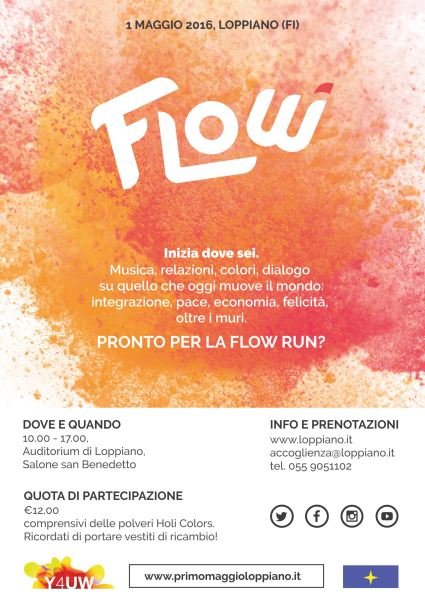
Apr 6, 2016 | Non categorizzato
 Info:www.primomaggio.it Live streaming from Loppiano
Info:www.primomaggio.it Live streaming from Loppiano
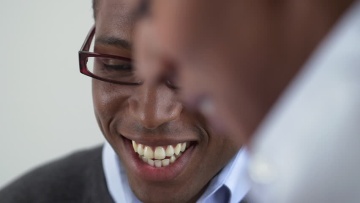
Apr 6, 2016 | Focolare Worldwide

Photo: Shutterstock

Apr 5, 2016 | Focolare Worldwide
 “March 22cnd will be forever marked by the cowardly attacks in the airport and in the metro in Brussels. They were actions of people who were not able to see love of neighbour as a priority in life, precisely during the days of Easter, a feast that proclaims: Love conquers all. It’s been a week in which feelings of deep hatred and a sense that God is requiring us to love every neighbour. That’s certainly not easy in moments like these. It’s in our nature to find perptrator. That’s what’s happening here in Belgium. We wonder where we went wrong and who was responsible for the radicalisation of that human being. It was also a week filled with novel questions for me. It’s been like constantly writing little letters to God and running every day to the mailbox to see if He’s answered them yet. It’s even worse when my own friends wonder why I still defend Muslims: ‘It’s all because of them,’ they say. ‘We should send them home. Why give to the refugees, and then they do away with us?’ I came to realize that I had to keep on doing the same exercise over and over again: to put myself in the skin of my friends who perhaps have not had the good fortune of experiencing God so near to them. Perhaps they haven’t realised that He is the only one that can give the answer: an answer of Love. They feel the fear that pushes them to prefer security and their own future. My effort was to show them the other side of the story: ‘Those people (the terrorists) aren’t Muslims. Islam embodies values that spread love. But when you try to do that, you are always met with resisitence. The wound is still fresh. I was hoping that I’d be able to bring enough healing to the wounds, but a complete cure will take time. This Good Friday I returned to my house weary and fed up with caring for “the wounds”. I can well imagine that it must have been a very hard week for the people who were on the front lines, caring for the wounded in body and in spirit. It is said that the young people of today don’t dare to express their faith. We no longer dare to talk about the things we believe in for fear of being cast from society. We no longer dare to do what we believe should be done. Perhaps it’s not fear of expressing ourselves, but tiredness because believing in Christian ideals is a tiring venture. The faith of Belgium is so exceptional and should muster up the strength to uphold its values. The young people choose to stop believing in order to avoid criticism. And this made me understand once more the strength of the ideal of peace and unity that Chiara Lubich taught us. It’s a sort of “cafe” for our weariness. It helps us to smile when we’re presented with cynical questions from our friends. These become opportunities for sharing our message . . . that’s the reason I follow Jesus! I’d like to ask God for more fire than I had before, a fire that lights candles in the hearts of young people. Candles that will enable us to look at one another in a positive light instead of criticising each other, so that the downward spiral will become an upward spiral and the faith will become a celebration rather than a preoccupation. A place where each of us can find the key to build a world in which attacks like those of March 22nd never happen again.”
“March 22cnd will be forever marked by the cowardly attacks in the airport and in the metro in Brussels. They were actions of people who were not able to see love of neighbour as a priority in life, precisely during the days of Easter, a feast that proclaims: Love conquers all. It’s been a week in which feelings of deep hatred and a sense that God is requiring us to love every neighbour. That’s certainly not easy in moments like these. It’s in our nature to find perptrator. That’s what’s happening here in Belgium. We wonder where we went wrong and who was responsible for the radicalisation of that human being. It was also a week filled with novel questions for me. It’s been like constantly writing little letters to God and running every day to the mailbox to see if He’s answered them yet. It’s even worse when my own friends wonder why I still defend Muslims: ‘It’s all because of them,’ they say. ‘We should send them home. Why give to the refugees, and then they do away with us?’ I came to realize that I had to keep on doing the same exercise over and over again: to put myself in the skin of my friends who perhaps have not had the good fortune of experiencing God so near to them. Perhaps they haven’t realised that He is the only one that can give the answer: an answer of Love. They feel the fear that pushes them to prefer security and their own future. My effort was to show them the other side of the story: ‘Those people (the terrorists) aren’t Muslims. Islam embodies values that spread love. But when you try to do that, you are always met with resisitence. The wound is still fresh. I was hoping that I’d be able to bring enough healing to the wounds, but a complete cure will take time. This Good Friday I returned to my house weary and fed up with caring for “the wounds”. I can well imagine that it must have been a very hard week for the people who were on the front lines, caring for the wounded in body and in spirit. It is said that the young people of today don’t dare to express their faith. We no longer dare to talk about the things we believe in for fear of being cast from society. We no longer dare to do what we believe should be done. Perhaps it’s not fear of expressing ourselves, but tiredness because believing in Christian ideals is a tiring venture. The faith of Belgium is so exceptional and should muster up the strength to uphold its values. The young people choose to stop believing in order to avoid criticism. And this made me understand once more the strength of the ideal of peace and unity that Chiara Lubich taught us. It’s a sort of “cafe” for our weariness. It helps us to smile when we’re presented with cynical questions from our friends. These become opportunities for sharing our message . . . that’s the reason I follow Jesus! I’d like to ask God for more fire than I had before, a fire that lights candles in the hearts of young people. Candles that will enable us to look at one another in a positive light instead of criticising each other, so that the downward spiral will become an upward spiral and the faith will become a celebration rather than a preoccupation. A place where each of us can find the key to build a world in which attacks like those of March 22nd never happen again.”
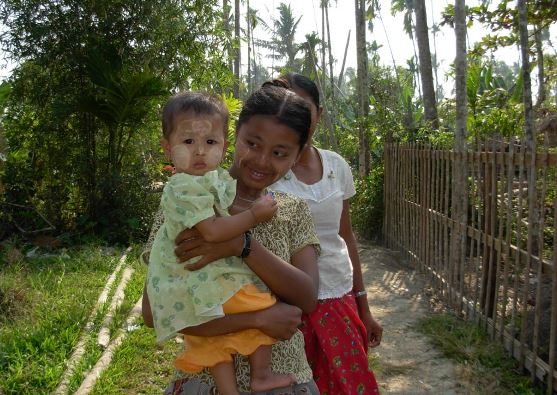
Apr 4, 2016 | Focolare Worldwide
 During the last visit to Taungoo, one of the regions where the Long Distance Support Project in Myanmar was launched, “we came to realise how many kids on Long Distance Support are now walking on their own,” writes the representative of AfnOnlus in Myanmar, Myanmar Vivienne Arpon. The visit by the local staff of Long Distance Support to the families of the children being supported was an opportunity to bring some concrete love and to better understand the difficulties they were facing. Marta had been abandoned by her husband when the children, Justin and Joseph, were small. Through the project she found the strength she needed to raise her family. When he finished school Justin won a scholarship in culinary arts at an Institute in Yangon, and Joseph became personnel assistant at a fabrics company. Philip and Anna’s family had been living in a slum in poor hygienic conditions. Long Distance Support has enabled them to live in a decent house and have a more dignified life. Although Philip is still studying, his parents have generously committed to support those who are worse off than they. “What gives us joy,” says Vienne, “is to notice how the improvement in the physical living conditions of these families has led to human and spiritual growth.” Since 2006 the project has expanded in response to requests for help from Eric, the Burmese coordinator. Thanks to the intervention of other NGOs it was possible to build a new school in Yenanchaung, the Magway region and find teachers and qualified personnel. The school children have been orphaned by HIV/AIDS or abandonment. Many of these teenagers have been able to find good jobs now, so that in addition to being financially independent they can even contribute something to their families. “We’re pretty confident,” Vivienne writes speaking to supporters, “that the future of these children is assured, not only because they can study, but because they felt the love from your side, which assures them. For all this, thank you very much for the sacrifices you have made. In fact, it is not always easy to live solidarity, but when you take into consideration those who are living in worse conditions than yours it can redimension your own needs and wants and can lead to a more sober lifestyle, perhaps even a freer life for yourself. One family from Messina, Italy writes of how their experience with long distance support with AFNonlus is enrichment for them that has opened them to the whole world. The boy they were supporting has grown up and, thanks to the support he received through the programme, is now working. Nevertheless, there are many other children living in conditions of need and the Sicilian family, in spite of the financial problems that everyone is going through, didn’t turn their backs on them. They decided to continue contributing their support: “With four children it isn’t easy to make ends meet. In spite of the uncertainty, we believe in this project and are very happy to offer some concrete help to people who are worse off than we are . . . in this case, little Vincenzo from Myanmar.” The Myanmar project extends through a territory which, due to environmental conditions and historic reasons was never developed adequately. Many families and children are victims of malnutrition and illness, such as malaria, tuberculosis and AIDS. With the support from contributors, the project is giving hope to people, offering a different future to the new generations and contributing to the human development of the population. For more information: The Focolare has been in the Asian world since 1966. Recent cultural and interreligious events have remembered those years: 50 anni di storia.
During the last visit to Taungoo, one of the regions where the Long Distance Support Project in Myanmar was launched, “we came to realise how many kids on Long Distance Support are now walking on their own,” writes the representative of AfnOnlus in Myanmar, Myanmar Vivienne Arpon. The visit by the local staff of Long Distance Support to the families of the children being supported was an opportunity to bring some concrete love and to better understand the difficulties they were facing. Marta had been abandoned by her husband when the children, Justin and Joseph, were small. Through the project she found the strength she needed to raise her family. When he finished school Justin won a scholarship in culinary arts at an Institute in Yangon, and Joseph became personnel assistant at a fabrics company. Philip and Anna’s family had been living in a slum in poor hygienic conditions. Long Distance Support has enabled them to live in a decent house and have a more dignified life. Although Philip is still studying, his parents have generously committed to support those who are worse off than they. “What gives us joy,” says Vienne, “is to notice how the improvement in the physical living conditions of these families has led to human and spiritual growth.” Since 2006 the project has expanded in response to requests for help from Eric, the Burmese coordinator. Thanks to the intervention of other NGOs it was possible to build a new school in Yenanchaung, the Magway region and find teachers and qualified personnel. The school children have been orphaned by HIV/AIDS or abandonment. Many of these teenagers have been able to find good jobs now, so that in addition to being financially independent they can even contribute something to their families. “We’re pretty confident,” Vivienne writes speaking to supporters, “that the future of these children is assured, not only because they can study, but because they felt the love from your side, which assures them. For all this, thank you very much for the sacrifices you have made. In fact, it is not always easy to live solidarity, but when you take into consideration those who are living in worse conditions than yours it can redimension your own needs and wants and can lead to a more sober lifestyle, perhaps even a freer life for yourself. One family from Messina, Italy writes of how their experience with long distance support with AFNonlus is enrichment for them that has opened them to the whole world. The boy they were supporting has grown up and, thanks to the support he received through the programme, is now working. Nevertheless, there are many other children living in conditions of need and the Sicilian family, in spite of the financial problems that everyone is going through, didn’t turn their backs on them. They decided to continue contributing their support: “With four children it isn’t easy to make ends meet. In spite of the uncertainty, we believe in this project and are very happy to offer some concrete help to people who are worse off than we are . . . in this case, little Vincenzo from Myanmar.” The Myanmar project extends through a territory which, due to environmental conditions and historic reasons was never developed adequately. Many families and children are victims of malnutrition and illness, such as malaria, tuberculosis and AIDS. With the support from contributors, the project is giving hope to people, offering a different future to the new generations and contributing to the human development of the population. For more information: The Focolare has been in the Asian world since 1966. Recent cultural and interreligious events have remembered those years: 50 anni di storia.


 A joint symposium on Mary in the Bible and Mariam in Quran also proved to be quite interesting. The unanimous conclusion: Mary, woman of love, mercy and compassion, is a mother for all Christians and Muslims. Another significant event saw the attendance of 80 cancer patients and survivors. The opening remarks were based on the spirituality of Chiara Lubich. At the Fo Guang Shan Mabuhay Buddhist Temple the awards ceremony of a digital poster-making contest took place. It was organized with the Buddhist International Association – Manila, on the theme “Creating Peace and Hope through Acts of Goodness”. An activity was also organized in Quezon City, Metro Manila, where, for some years now, Sulyap ng Pag-asa (Glimpse of Hope) is found. It is a housing project of the Focolare undertaken for the purpose of providing housing to homeless families. Here some 90 Christian and Muslim children spent an exciting afternoon together, with songs, dances and games which helped them understand how to build fraternity despite differences in culture and religion. The culminating activity of the week-long celebration was the Festival of Harmony held in a big shopping mall in Mandaluyong, Metro Manila. It attracted an extraordinary participation indeed. Cardinal Tagle and the participants in the breakfast dialogue were joined by other institutional dignitaries, by people who had participated in the various events during the week, by ordinary people. After highlighting mutual cooperation between the government and the religious sectors in promoting religious freedom, dialogue and peace, the program continued with musical numbers from the youth and children of various faith groups. A young member of the Focolare introduced a choreography and said: “To attain love, mercy and compassion as wellsprings of peace, there is the need to overcome diversities, … and to be united for peace and harmony.” With other children of different religions, a girl was chosen to speak in the name of the Roman Catholic Church. She said: “To me, peace is harmony and love. When God created the world, everything was fine. There was balance and harmony with the plants and animals. When man came, it was okay for a while until he became greedy. He cut down trees, flattened mountains and now cement is everywhere! Animals became extinct. There is no more balance and harmony. I dream of harmony in nature. I dream of no war.” Cardinal Tagle’s concluding remarks were an emotional one. Clearly touched and grateful to the children who spoke, he cited all the various talks making the different subjects his own.
A joint symposium on Mary in the Bible and Mariam in Quran also proved to be quite interesting. The unanimous conclusion: Mary, woman of love, mercy and compassion, is a mother for all Christians and Muslims. Another significant event saw the attendance of 80 cancer patients and survivors. The opening remarks were based on the spirituality of Chiara Lubich. At the Fo Guang Shan Mabuhay Buddhist Temple the awards ceremony of a digital poster-making contest took place. It was organized with the Buddhist International Association – Manila, on the theme “Creating Peace and Hope through Acts of Goodness”. An activity was also organized in Quezon City, Metro Manila, where, for some years now, Sulyap ng Pag-asa (Glimpse of Hope) is found. It is a housing project of the Focolare undertaken for the purpose of providing housing to homeless families. Here some 90 Christian and Muslim children spent an exciting afternoon together, with songs, dances and games which helped them understand how to build fraternity despite differences in culture and religion. The culminating activity of the week-long celebration was the Festival of Harmony held in a big shopping mall in Mandaluyong, Metro Manila. It attracted an extraordinary participation indeed. Cardinal Tagle and the participants in the breakfast dialogue were joined by other institutional dignitaries, by people who had participated in the various events during the week, by ordinary people. After highlighting mutual cooperation between the government and the religious sectors in promoting religious freedom, dialogue and peace, the program continued with musical numbers from the youth and children of various faith groups. A young member of the Focolare introduced a choreography and said: “To attain love, mercy and compassion as wellsprings of peace, there is the need to overcome diversities, … and to be united for peace and harmony.” With other children of different religions, a girl was chosen to speak in the name of the Roman Catholic Church. She said: “To me, peace is harmony and love. When God created the world, everything was fine. There was balance and harmony with the plants and animals. When man came, it was okay for a while until he became greedy. He cut down trees, flattened mountains and now cement is everywhere! Animals became extinct. There is no more balance and harmony. I dream of harmony in nature. I dream of no war.” Cardinal Tagle’s concluding remarks were an emotional one. Clearly touched and grateful to the children who spoke, he cited all the various talks making the different subjects his own.


 “While realizing that the foundation of the Gospel is charity… we did not immediately understand how to live it, nor with whom, nor to what degree we were to put it into practice. At the beginning, due mainly to the distressing circumstances of the war, we directed our love toward the poor. We were convinced that in those gaunt and, at times, repulsive faces, we could make out the face of the Lord. It was a real training. We were not accustomed to loving supernaturally. At most, we cared about our relatives or our friends in a spirit of warm respect or in a purely natural and healthy friendship. Now, under the impulse of grace, trusting in God and in his Providence which cares for the birds of the air and the flowers of the field, we addressed our attention to all the poor of the city. We invited them to our houses, to eat at our table… (…) When we could not receive them in our home, we arranged to meet them somewhere, and we gave them whatever we had managed to put together. We visited them in their dismal shacks and we comforted them and offered them medicines. The poor were truly the object of our love because for them and through them we could love Jesus. They became the concern also of those who had been attracted by our common ideal. As the community grew around the initial nucleus of the focolarine, the possibilities of helping, of assisting whoever suffered grew. And it was quite a sight to see tons of food, clothing and medicine arrive; it was an unusual abundance which, considering that we were in the last years of the war, clearly made the special intervention of divine Providence obvious to anyone. (…) These are small events which happen to whoever, being a follower of Jesus, experiences ‘Ask and it will be given to you’ (Mt 7:7). Nevertheless, they never ceased to amaze us. At the same time, we were encouraged by other extraordinary events experienced by our great brothers and sisters who had preceded us and who also knew—at a time when they were not yet saints—the difficulties encountered in the ascent to God, in the process of thawing the hardened human personality by the fire of Divine Love. Hadn’t Saint Catherine, in her love for the poor, given to one her mantle and to another the cross on her rosary? And hadn’t Jesus appeared to her in a vision the following nights to thank her for the gifts she had given to him in the poor? And didn’t St. Francis give away his cloak to the poor some thirty times? Surely, then, it was no great sacrifice for us to take off our gloves in the winter and offer them to somebody who needed to beg for hours out in the cold just to survive (…) Yet, in spite of everyone’s great generosity (…) it became clear that perhaps this was not the immediate goal for which the Lord had urged us to love in a concrete way. It was only later that we seemed to understand the Lord had urged us in this direction also for an intention of his own: it is in love and through the practice of love that one can better comprehend the things of heaven, and that God can more easily enlighten our souls. It was probably because of this concrete love that later on we understood that we didn’t have to turn only towards the poor but towards everyone indiscriminately. No doubt there were people who needed to be fed, to be given drink, to be clothed, but also those who needed to be educated, advised, put up with, or who were in need of our prayers…. The corporal and spiritual works of mercy opened up before us. Furthermore, they were the precise questions that the Judge of our lives would ask in order to decide our eternity. This thought immersed us in adoration considering the infinite love of Jesus who had revealed them to us when he came on earth so as to make it easier for us to get into heaven. (…) God was not asking us only to love the poor, but each and every neighbour, whoever they were, as we love ourselves. So if we came across someone who was weeping, we tried to weep with him and their cross was lightened. If someone rejoiced we rejoiced with them, and the joy was all the greater. ‘Rejoice with those who rejoice, weep with those who weep’ (Rom 12:15).”
“While realizing that the foundation of the Gospel is charity… we did not immediately understand how to live it, nor with whom, nor to what degree we were to put it into practice. At the beginning, due mainly to the distressing circumstances of the war, we directed our love toward the poor. We were convinced that in those gaunt and, at times, repulsive faces, we could make out the face of the Lord. It was a real training. We were not accustomed to loving supernaturally. At most, we cared about our relatives or our friends in a spirit of warm respect or in a purely natural and healthy friendship. Now, under the impulse of grace, trusting in God and in his Providence which cares for the birds of the air and the flowers of the field, we addressed our attention to all the poor of the city. We invited them to our houses, to eat at our table… (…) When we could not receive them in our home, we arranged to meet them somewhere, and we gave them whatever we had managed to put together. We visited them in their dismal shacks and we comforted them and offered them medicines. The poor were truly the object of our love because for them and through them we could love Jesus. They became the concern also of those who had been attracted by our common ideal. As the community grew around the initial nucleus of the focolarine, the possibilities of helping, of assisting whoever suffered grew. And it was quite a sight to see tons of food, clothing and medicine arrive; it was an unusual abundance which, considering that we were in the last years of the war, clearly made the special intervention of divine Providence obvious to anyone. (…) These are small events which happen to whoever, being a follower of Jesus, experiences ‘Ask and it will be given to you’ (Mt 7:7). Nevertheless, they never ceased to amaze us. At the same time, we were encouraged by other extraordinary events experienced by our great brothers and sisters who had preceded us and who also knew—at a time when they were not yet saints—the difficulties encountered in the ascent to God, in the process of thawing the hardened human personality by the fire of Divine Love. Hadn’t Saint Catherine, in her love for the poor, given to one her mantle and to another the cross on her rosary? And hadn’t Jesus appeared to her in a vision the following nights to thank her for the gifts she had given to him in the poor? And didn’t St. Francis give away his cloak to the poor some thirty times? Surely, then, it was no great sacrifice for us to take off our gloves in the winter and offer them to somebody who needed to beg for hours out in the cold just to survive (…) Yet, in spite of everyone’s great generosity (…) it became clear that perhaps this was not the immediate goal for which the Lord had urged us to love in a concrete way. It was only later that we seemed to understand the Lord had urged us in this direction also for an intention of his own: it is in love and through the practice of love that one can better comprehend the things of heaven, and that God can more easily enlighten our souls. It was probably because of this concrete love that later on we understood that we didn’t have to turn only towards the poor but towards everyone indiscriminately. No doubt there were people who needed to be fed, to be given drink, to be clothed, but also those who needed to be educated, advised, put up with, or who were in need of our prayers…. The corporal and spiritual works of mercy opened up before us. Furthermore, they were the precise questions that the Judge of our lives would ask in order to decide our eternity. This thought immersed us in adoration considering the infinite love of Jesus who had revealed them to us when he came on earth so as to make it easier for us to get into heaven. (…) God was not asking us only to love the poor, but each and every neighbour, whoever they were, as we love ourselves. So if we came across someone who was weeping, we tried to weep with him and their cross was lightened. If someone rejoiced we rejoiced with them, and the joy was all the greater. ‘Rejoice with those who rejoice, weep with those who weep’ (Rom 12:15).” 








